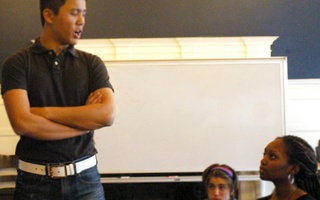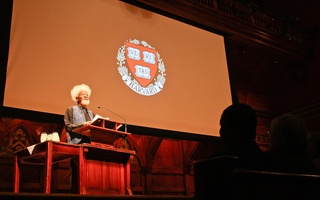Employing time to drill through to
his sanity
That same year, he would also publish a prose work, The Man Died: Prison Notes of Wole Soyinka (1972), which the Swedish Academy called “a literary work of the first rank.”
If Soyinka still feels bitter about his extrajudicial imprisonment, he does not show it. In fact, he reflects on those two years with astonishing forbearance. He proudly reveals that the official who held him in prison is now a close friend of his. “You find that those who carry out orders are sometimes far more assiduous than the person at the top,” he explains.
He does not exaggerate the emotional toll that those 24 months had on him, nor does he inflate the significance of his personal experiences in the context of Nigeria’s struggles.
“I lost so many colleagues and friends during that period and I could have perished,” he says. “It was not a pleasant experience to be placed in solitary confinement for nearly two years, without books. But you look back and you look at other things which have happened within the nation, what you underwent just fades into insignificance.”
Soyinka says he opposed the civil war in Nigeria because he held certain convictions about how a government should treat its people.
For fearlessly defending his principles, Gates wrote in an August New York Times op-ed, Soyinka has “gained the reputation as the conscience of Nigeria.”
After his release from prison in 1970, Soyinka fled Nigeria. “I just needed a break from the environment,” he says. Over the next 20 years, he would spend time in and out of the country, teaching drama and literature at universities and writing, all the while remaining active in numerous political and civic organizations.
During a stint as a visiting professor at the University of Cambridge from 1973-1974, Soyinka encountered a recent Yale graduate with “an adventurous mind,” and the two would form a close friendship.
USHER OF A NEW WORLD
Gates, who was pre-med and pre-law in college, traveled to England in 1973 on a Mellon Fellowship, hoping to find some direction at Cambridge.
Gates says Soyinka was the first person who told him he could be a scholar and critic of African literature.
“I had studied history at Yale, and I went to Cambridge and started all over,” Gates says. “He was my usher into this new world of literary studies.”
Read more in Arts
YellowArrow Aimed at Building Art CommunityRecommended Articles
-
Du Bois Legacy CelebratedPoet Laureate Rita Dove, Nobel Prize-winning author Wole Soyinka and President Neil L. Rudenstine all praised W.E.B. Du Bois yesterday
-
Nobel Laureates Honor Wole Soyinka at IOPNobel laureates Nadine Gordimer, Derek Walcott, and Toni Morrison joined hundreds of audience members last night at the John F.
-
Author Speaks About SudanNigerian author Wole Soyinka, the first African to win the Nobel Prize for Literature, argued that the Arab section of
-
 Death and the King's Horseman
Death and the King's Horseman -
 Committee on African Studies Commemorates Mandela Three Months After Death
Committee on African Studies Commemorates Mandela Three Months After Death













